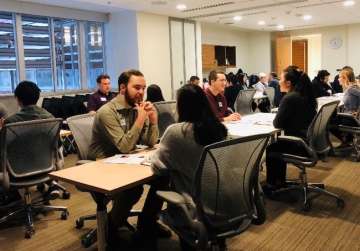After she graduated from college and returned home to Los Angeles, Mary Leila Cole struggled to find a job. Her stepmother helped her find work at a clothing store. But the company downsized and let her go. She then went on a series of interviews for jobs in food service and retail.
“I was just not very successful,” said Cole, now 31. “I didn't know what to do. Even the basic question ‘Tell me about yourself,’ I didn’t know what to say. It was frustrating.”
Cole was diagnosed with autism as a child. When she was in the eighth grade and finding it tough to make friends, her parents enrolled her in PEERS for Adolescents, a social skills program at the UCLA Semel Institute for Neuroscience and Human Behavior. When the institute began a similar program focused on employment, Cole signed up in 2020.
PEERS for Careers teaches autistic young adults the skills to find and keep a job. Over the course of four months, they are paired with coaches to learn interviewing techniques, resume creation and conflict resolution.
There are 5 million autistic adults in the U.S., many of whom struggle to find a job.
“When you look at the unemployment rates, they go as high as 80%,” said Elizabeth Laugeson, PsyD, director of the UCLA PEERS (Program for the Education and Enrichment of Relational Skills) Clinic. “That's not acceptable. These are often very bright, talented individuals who are very capable of obtaining and maintaining employment if given the opportunities. But they often struggle because of the social aspects.”
PEERS for Careers is an evidence-based research study now in its sixth year. A pilot study and three-year clinical trial with 106 participants established that its curriculum not only helped increase participants’ social skills knowledge, but also supported employment outcomes. Participating adults’ engagement in employment-related activities, like obtaining internships and jobs, jumped from 35% to 54% in just 20 weeks, with even more finding work after the program ended.
In its current phase, PEERS for Careers is building a pipeline to employment in the biomanufacturing industry.
“Society at large is really missing out if we're not including autistic individuals in the workforce, and in particular, the biomanufacturing industry is really well suited to the strengths and talents of autistic individuals,” said Amanda Gulsrud, PhD, director of the UCLA Child and Adult Neurodevelopmental Clinic at the Semel Institute.
Soft skills
Participants meet with the group weekly and then have homework assignments to practice the skills discussed. The pilot study was in person. But the first year of the clinical trial had to pivot to an online format due to the COVID-19 pandemic. The program continues in a remote format.
At the heart of PEERS for Careers is the pairing of the autistic young adult with a career coach. That’s done through an activity very similar to speed dating. In speed coaching, participants and coaches interview each other for five minutes, and pairs are matched based on mutual rankings.

Career coaches are volunteers who are current UCLA undergraduate and graduate students. Program leaders believe it is more effective to learn social interaction skills when young adults are matched with similar-age peers.
“There usually is some sort of work experience that the coach has had, but we don't rely on them being experts,” said Dr. Laugeson, a clinical professor in the department of psychiatry and biobehavioral sciences at the David Geffen School of Medicine at UCLA. “Many of the career coaches haven't even held full-time employment yet. And so they're really going through the program in tandem with the autistic participant. They're learning together.”
Cole was paired with Trisha Kurup, who graduated from UCLA with a Bachelor’s degree in physiological science just a few months before becoming a career coach in the program. “I think I got lucky,” said Cole. “She was so sweet and so lovely. She helped me with everything.”
The pair practiced skills such as interviewing, resume writing and workplace conversation. One of the techniques was called the Me, You, Us Story – an effective way to answer the interview question Cole dreaded most: having to talk about herself.
“Me is what makes you qualified for this job that you're seeking,” said Dr. Laugeson. “You is what attracts me to this job. And Us is why we are the perfect couple.”
Soon after the program ended, Cole interviewed at the Hollywood Bowl, was hired, and worked as an usher for three years, a job she loved. She was also an usher at the Hollywood Pantages Theatre. Currently, she is working part-time as a costume assistant for a children’s theater group in Los Angeles.
An important topic covered during the PEERS for Careers program was deciding to disclose a diagnosis of autism.
“Autism is often misunderstood,” said Dr. Gulsrud, an associate clinical professor in the department of psychiatry and biobehavioral sciences at the David Geffen School of Medicine at UCLA. “And so, not every individual who is neurodivergent actually tells their employer.”
At the Hollywood Bowl, Cole told her co-workers but not her managers, who entrusted her with the same tasks as other ushers. At the Hollywood Pantages Theatre, she said there were other ushers who were autistic but were not comfortable sharing. In her current job at the children’s theater, she has so far not disclosed.
“I think it just depends on the person and whenever they think the time is right,” said Cole. “It's a part of who I am and what separates me from everybody else. At the end of the day, everybody is their own person, whether they're on the spectrum or not.”
Biomanufacturing
In the last five years, PEERS program staff have compiled a catalog of about 200 employers interested in hiring neurodiverse talent or offering internships.
“There's a lot of people out there in the employment sector that want to support autistic adults in their job seeking but not know how to,” said Dr. Laugeson. “And that's where this next phase of our research comes in to create more supportive and inclusive work environments.”
She and her colleagues are now recruiting autistic young adults who are interested in careers in the biomanufacturing industry. A workforce shortage means 1 million jobs will need to be filled over the next decade.
The program will combine 16 weeks of soft skills instruction, plus two weeks of hands-on technical training in biomanufacturing by the program’s partners at the National Center for Therapeutics Manufacturing at Texas A&M. In addition, future employers – including Pfizer and Janssen (a subsidiary of Johnson & Johnson) – will be supported in fostering an inclusive environment to ensure that autistic employees can succeed.
Dr. Laugeson said research shows that autistic adults of average to above average intellectual ability often gravitate toward STEM jobs. That’s due to the strengths that autistic individuals bring to those jobs which, broadly speaking, can include hyper-attention to detail; thriving with routine, repetitive tasks; and the ability to work without a lot of social interaction.
“For so long, society has highlighted the challenges that autistic individuals face,” said Dr. Gulsrud. “But, thankfully, we are now learning to celebrate the unique strengths. This is their superpower. And if we can harness it, they're going to do amazing things.”



